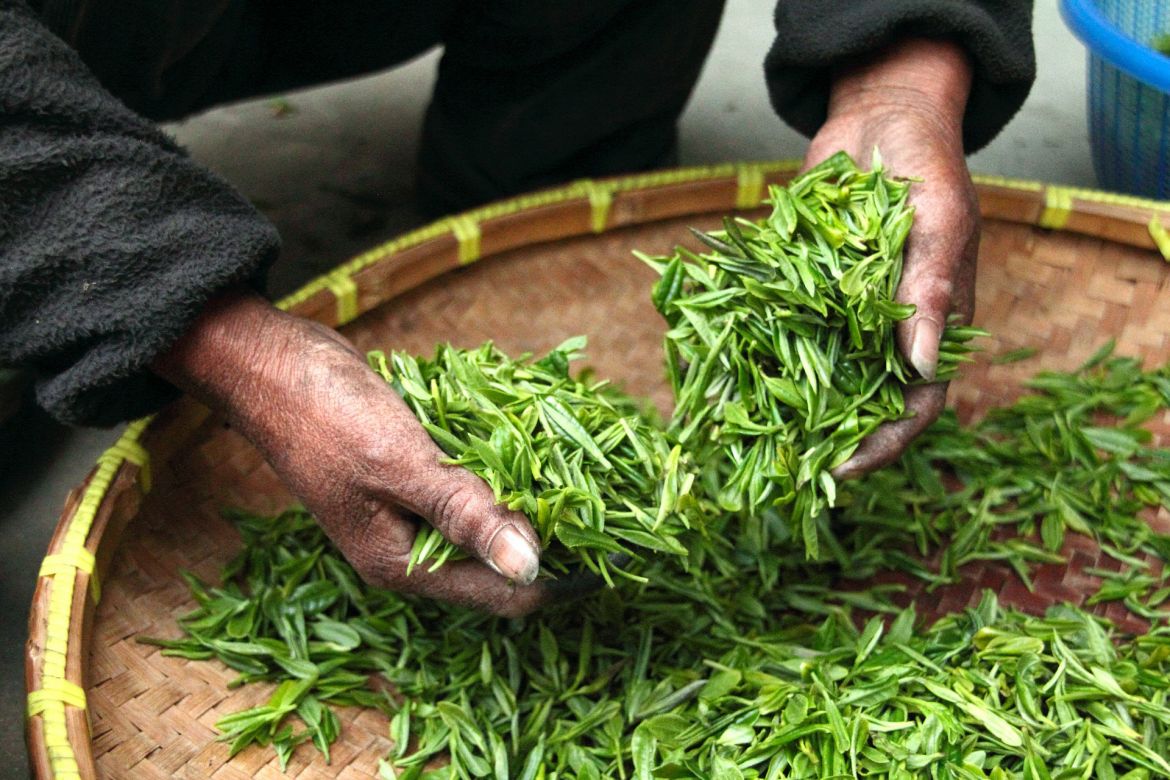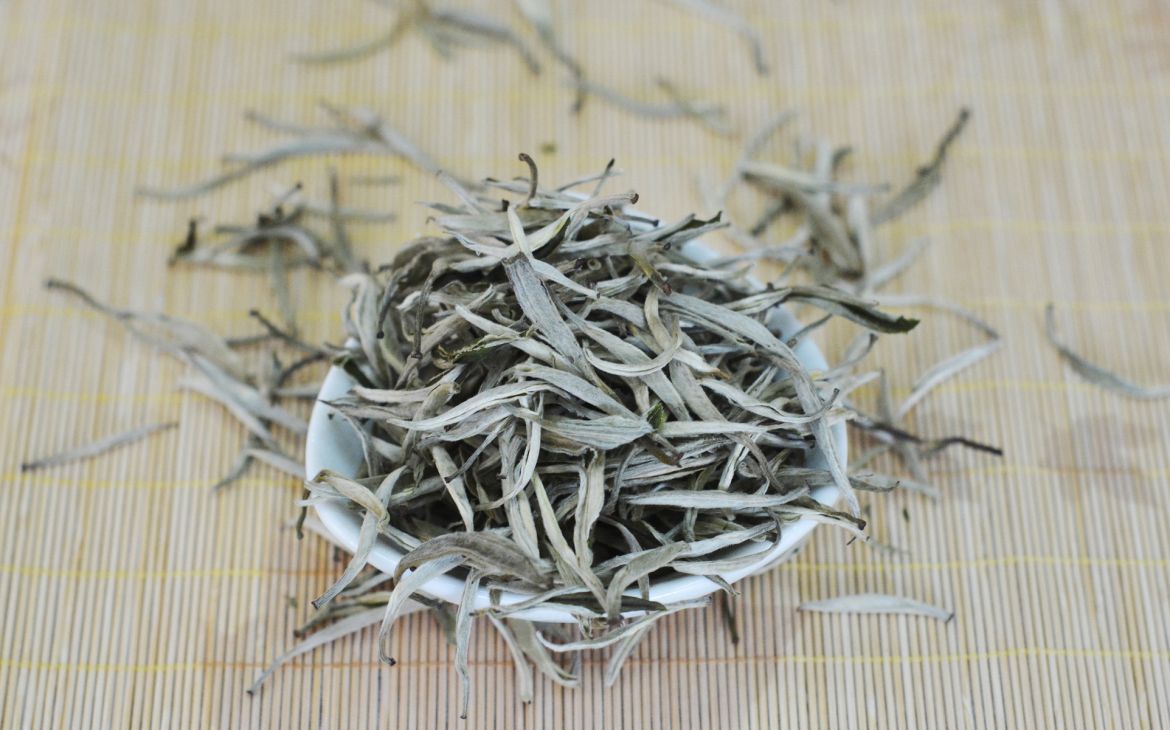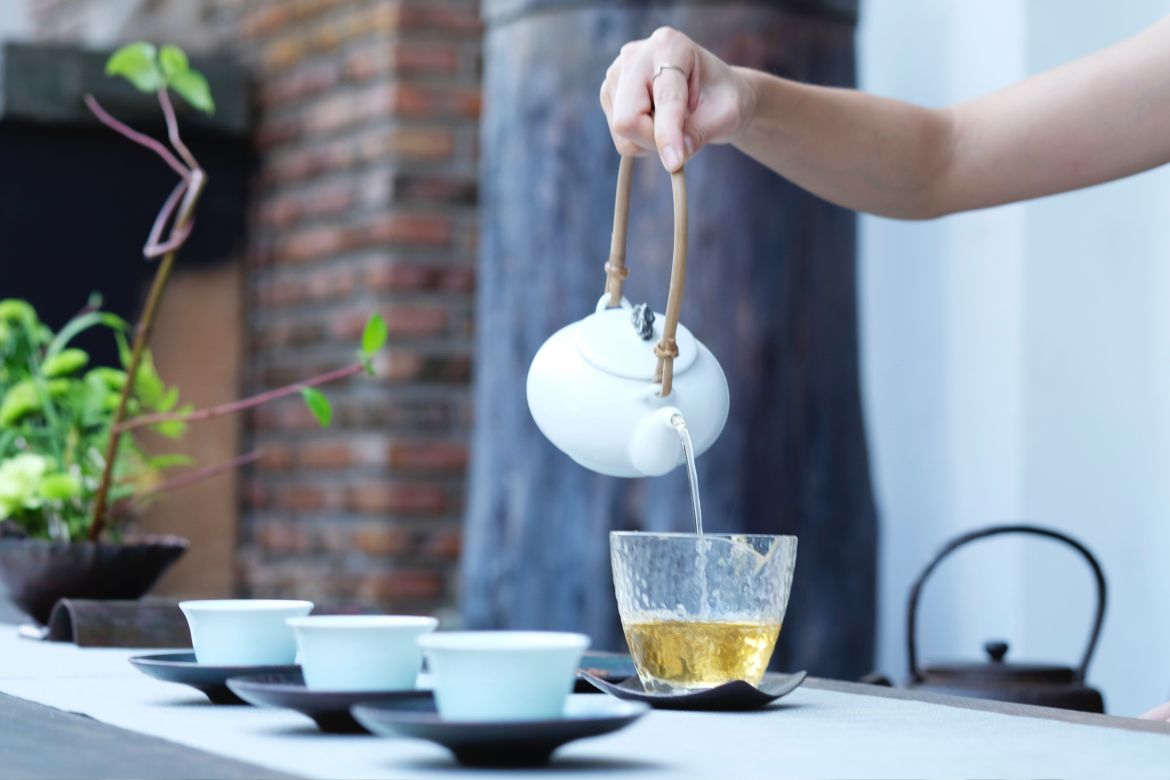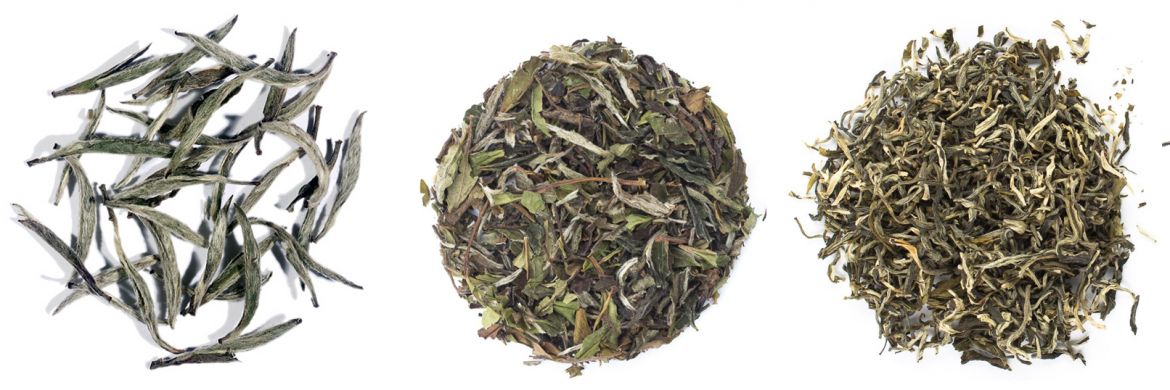Flavoured Green/White Tea
White Tea
White Tea
(White Peony)
Silver Needle Organic
The Unique Qualities of White Tea
The taste of white tea is exceptionally mild, with a light, almost honey-like sweetness, and a dilute finish. The brewed tea is not white, but a pale-yellow colour. White tea is universally revered by tea connoisseurs, who appreciate the subtle nuances.
Researchers say that White Tea has some of the highest antioxidant levels of any teas. Made from the unopened buds of the tea plant, white tea derives its name from the silvery-white hairs that adorn each bud and give the dried leaves their white appearance.
Harvesting and Production

White teas are produced from early to late spring. Buds for Bai Hao Yin Zhen are picked in the very early days of spring and are the first to be manufactured.
The picking schedule for Bai Hao Yin Zhen is only a few days each year and must end before the middle of March. Yin Zhen must be plucked on a day when there is no rain or dew present in the morning and the buds must be in top condition.
The Pai Mu Tan harvest begins once Bao Hao Yin Zhen is finished, so it usually starts around mid-March and ends around the 10th of April.
The third and last picking is for Gong Mei and Shou Mei which are the lower grade white teas.
White tea consists of tea leaves that are withered and dried; no firing, heating or rolling is applied. The leaves used are the downy, fuzzy top buds of an emerging leaf and the two unfolded leaves next to it. These are harvested by hand each spring. White tea undergoes fewer steps than any other tea class to become a saleable product.
The freshly plucked buds or buds and leaves are briefly withered, during which a very light oxidation naturally occurs that turns them grey-green or grey-brown.
Then, in most cases, the leaves are moved directly to the drying step, which is done gently and under carefully controlled conditions either naturally (by air or sun) or mechanically (by a hot air machine).
In the cup, we can taste the rich softness, with underlined nuances of honey, chestnuts, apricots and brown rice. Yin Zhen infuses into a pale honey colour, however white teas can range from pale orange to almost copper. In any case, the cup colour reflects the unique processing of the fresh bud or leaf material.
Producers of White Tea
Producers in China would like the international tea market to believe that white tea can come only from the downy, snow-white tender first buds of the Da Bai (large white) tea bush cultivated in Fujian Province, where the production of white tea originated. Not surprisingly however, there are other producers, primarily in Nepal, Sri Lanka, Thailand and India where white tea is defined by the process, not the plant and its location.
China’s Fujian Province is seen as the birthplace of white tea. This mountainous province produces an astonishing treasure chest of incomparable teas; in fact, Fujian is one of only a few areas in China that produces four of the six classes of tea, including wood-smoked and flower-scented teas.
White tea is the feather in the jewelled tea crown of Fujian. This is in addition to its production of the powerful and lush Wu Yi Shan and Anxi Oolongs, fragrant fresh flowery Jasmine tea, elegant Bai Lin Congou of the black tea family, of course a wide variety of green teas and the historically important smoky Lapsang Souchong black tea.
History of White Tea
Once white tea came into production in the late 1700s (mid-Qing dynasty, 1644-1911), it was leaf rather than powdered tea that was used to create white tea. Loose leaf tea was becoming the fashion of the day, promoting a new era in which tea was steeped freely in a small teapot. Bud white teas, such as Bai Hao Yin Zhen, however, did not appear until the late 1800s.
Several sub-varieties of tea bushes indigenous to the northeast corner of Fujian Province (close to the Zhejiang border) were deemed to be most beneficial at producing juicy, fat buds with an attractive appearance and excellent flavour. The best of these, the Da Bai varieties, were especially cultivated for the production of shapely white tea buds, which became known as Bai Hao Yin Zhen, or Silver Needles, the most famous white tea in China.

The End of Imperial China
China’s imperial days ended in 1911 after 2000 years of imperial rule. Production of China’s famous teas continued. During the 1920’s, Fujian tea farmers began to produce a new style of white tea – Bai Mudan (White Peony) – predominately for export to the United Kingdom.
More Recent Times
A further modification to white tea came during the 1960’s when additional styles of leafy white teas were created. These modern-style white teas are variations of Bai Mudan that allowed tea producers to include leaf and buds from white tea bushes that were plucked later in the spring.
How to Brew White Tea
The delicate character of white tea can easily be lost if the leaves are infused with water that is too hot.
White tea should be treated like green tea and only be brewed with water that has boiled and cooled to around 85C.
Because of the fluffy, airy nature of modern white teas, a large heaped teaspoon of leaves per cup should be used. White tea is also suitable for repeat infusing of up to three times.
The first infusion should be the shortest of around 90 seconds and can extend to up to 2-3 minutes for the final steeping.

Brewing White Tea:
- Boil fresh water and leave to cool slightly.
- Place your white tea in a tea strainer or infuser
- Pour the freshly cooled hot water over the tea
- Steep the tea for the appropriate amount of time
- Strain the tea
- Sit back, relax and enjoy!
Brewing Table
 Ranging from 1 level teaspoon to 1 heaped teaspoon
Ranging from 1 level teaspoon to 1 heaped teaspoon
 2-3 minutes
2-3 minutes
 Light Yellow, Yellow/Green and Golden Yellow
Light Yellow, Yellow/Green and Golden Yellow
NOTE: Please make sure to read the individual brewing instructions on each pack of tea.
We have so many delicious and aromatic white teas available. Our love of fine and rare teas knows no bounds.
White tea makes a delicate brew with a fresh, mild and sweet flavour.
Our White Tea favourites are below:

Silver Needle Organic Pai Mu Tan Organic Silver Yunnan Organic
- Silver Needle Organic - A truly special treat! An exception ally high quality Chinese tea with gentle, stunning floral notes
- Pai Mu Tan Organic - A classic superior white tea! Fragrant, flowery and aromatic
- Silver Yunnan Organic - A full flavoured tasting tea with a soft, fruity and flowery finish





 EARN POINTS WITH OUR LOYALTY SCHEME
EARN POINTS WITH OUR LOYALTY SCHEME















